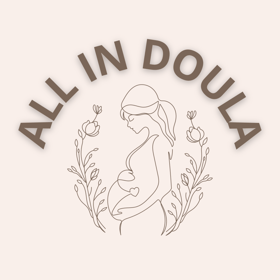Myths About Birth
Allow me to help you debunk common misconceptions about birth with science-backed facts, helping expectant parents navigate childbirth with confidence.
Briana Whitsitt
3/17/20254 min read


The fact is, there is way too much fear mongering surrounding birth.
When it comes to childbirth, myths often cloud the truth, leaving expectant parents feeling uncertain about what to expect. With so much information out there, it can be tricky to know what’s based on real science and what’s just a misconception passed down over the years. That’s why it’s important to separate fact from fiction when it comes to birth.
A common myth people often hear is that labor is always long, drawn-out, and excruciating. You’ve probably seen it on TV shows where women are screaming in pain for hours, right? But the truth is, not all labors are like that! Labor can vary greatly from person to person, and it doesn’t always last for hours on end. In fact, for first-time moms, the average duration of labor is around 12 to 14 hours, but many women experience much shorter labors. Pain management has come a long way, too. From epidurals to breathing exercises and even water immersion, there are lots of ways to make the process more manageable. A study published in The Journal of Maternal-Fetal & Neonatal Medicine found that with the right pain management, many women report a much more comfortable experience, with less perceived pain overall. So, while labor can be intense, it’s not always the endless, agonizing experience you might think.
Another myth that has a lot of people worried is the idea that home births are unsafe. Many people assume that hospitals are the only place where birth can happen safely, but evidence shows otherwise. Planned home births with trained midwives or doulas can be just as safe, if not safer, than hospital births for low-risk pregnancies. A large study published in the British Medical Journal in 2014 found that home births attended by skilled professionals resulted in fewer interventions, like C-sections, and similar health outcomes for babies. Of course, home birth isn’t for everyone. It’s important to have a thorough screening process and a clear plan for emergencies. But if you’re a low-risk mom-to-be, home birth can be a safe, beautiful alternative to the hospital setting.
The myth that you absolutely need an epidural to manage labor pain is also one worth addressing. Many people think that an epidural is the only option for pain relief, but in reality, there are plenty of other ways to manage discomfort during labor. Techniques like hypnobirthing, breathing exercises, and water immersion have been shown to be just as effective, and often come with fewer side effects. A systematic review published in The Cochrane Library in 2018 found that methods like water immersion and massage can reduce pain perception without the need for medications. Every woman’s experience of labor is unique, and the beauty of modern birth is that you have many choices when it comes to pain management. You don’t have to go down the epidural route unless that’s the option that feels best for you!
One of the biggest myths surrounding birth is the idea that C-sections are always the best or only option when something goes wrong. While C-sections are absolutely necessary in certain situations, they’re not always the first line of defense. Research shows that many C-sections are performed unnecessarily, and there are often other interventions that can be tried first, like repositioning the baby or using tools like forceps or a vacuum extractor. A 2016 study in The Lancet revealed that while C-sections are life-saving in certain cases, many countries have C-section rates much higher than necessary, sometimes reaching over 30%, when the ideal range is between 10% and 15%. The takeaway here is that C-sections should not be seen as the default in emergency situations. There are other ways to approach complications, and many of them can help avoid unnecessary surgeries.
Lastly, the myth that labor will always start naturally on its own can set some women up for disappointment or unnecessary stress. While it’s true that many births start spontaneously, there are plenty of reasons why labor might need to be induced—whether it's because the baby is overdue, there are concerns about the mother’s health, or the baby is showing signs of distress. Evidence actually supports that labor induction can be a safe and effective option when medically necessary. A study in Obstetrics & Gynecology found that induction of labor for reasons like gestational diabetes or post-term pregnancy often led to better outcomes compared to waiting for labor to start on its own. Induction, when done appropriately, can help ensure the health of both mom and baby, so it’s not something to fear.
Another myth floating around is the idea that birth plans are unrealistic and will only lead to disappointment. Many people assume that if you write out a plan for your ideal birth, things will inevitably go wrong, and you’ll end up feeling let down. While it's true that birth can be unpredictable, having a birth plan is a great way to communicate your preferences to your care team and ensure that you feel heard. Evidence shows that having a birth plan helps empower expectant parents to make informed decisions, even if things don’t go exactly as planned. In fact, a study published in The Journal of Obstetric, Gynecologic, & Neonatal Nursing found that women who made informed choices and had a clear birth plan were more satisfied with their birth experience, regardless of whether they got their “perfect” birth.
As we’ve seen, there’s a lot of misinformation floating around about childbirth, but the beauty of evidence-based birth is that it allows you to make informed, empowered decisions. By understanding the facts, you can better navigate your own pregnancy journey, avoiding unnecessary interventions and feeling confident about the choices you make. If you're feeling overwhelmed or unsure, hiring a doula can be a game-changer. We specialize in providing education, support, and guidance throughout your pregnancy, helping you make informed decisions. Whether you’re considering home birth, exploring pain management options, or just want to know more about your rights and choices, we’re here to help you feel confident and empowered in your birth experience. Let us be part of your journey to a positive and informed birth!
